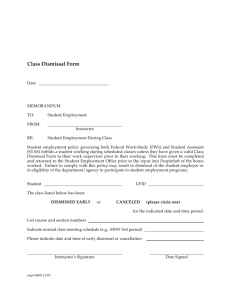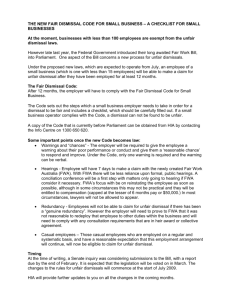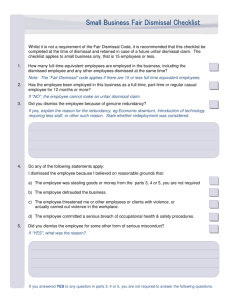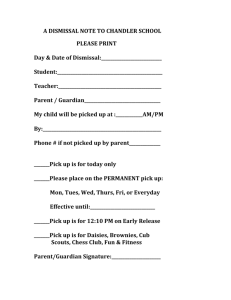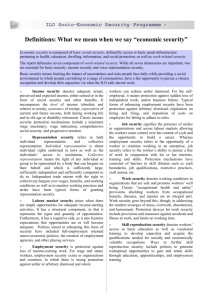What is Unfair Dismissal? - Womens Legal Service Tasmania
advertisement
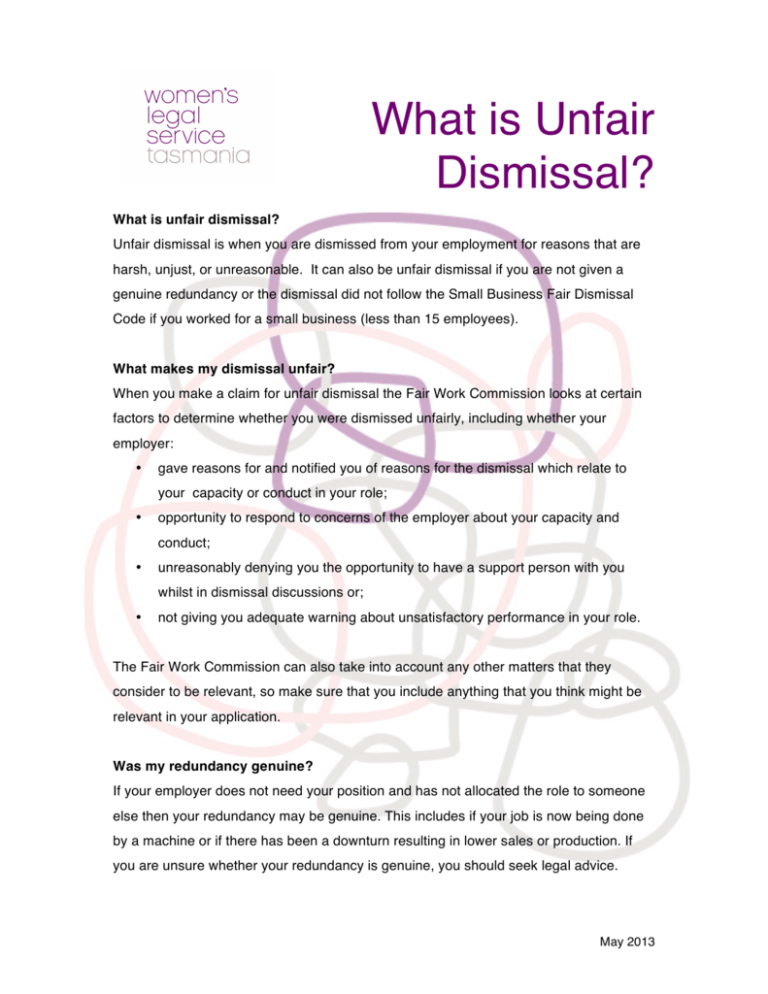
What is Unfair Dismissal? What is unfair dismissal? Unfair dismissal is when you are dismissed from your employment for reasons that are harsh, unjust, or unreasonable. It can also be unfair dismissal if you are not given a genuine redundancy or the dismissal did not follow the Small Business Fair Dismissal Code if you worked for a small business (less than 15 employees). What makes my dismissal unfair? When you make a claim for unfair dismissal the Fair Work Commission looks at certain factors to determine whether you were dismissed unfairly, including whether your employer: • gave reasons for and notified you of reasons for the dismissal which relate to your capacity or conduct in your role; • opportunity to respond to concerns of the employer about your capacity and conduct; • unreasonably denying you the opportunity to have a support person with you whilst in dismissal discussions or; • not giving you adequate warning about unsatisfactory performance in your role. The Fair Work Commission can also take into account any other matters that they consider to be relevant, so make sure that you include anything that you think might be relevant in your application. Was my redundancy genuine? If your employer does not need your position and has not allocated the role to someone else then your redundancy may be genuine. This includes if your job is now being done by a machine or if there has been a downturn resulting in lower sales or production. If you are unsure whether your redundancy is genuine, you should seek legal advice. May 2013 What does the Small Business Fair Dismissal Code say? You can be summarily (immediately) dismissed if your misconduct or misbehaviour is serious enough that your employer thinks that they could reasonably dismiss you. Serious misconduct that might result in summary dismissal includes: violence, fraud, theft or serious breaches of occupational health and safety. If there is no summary dismissal then the small business must give you a valid reason based on your capacity, as to why you may be at risk of being dismissed. If you do not improve after being given a warning then you may be dismissed, however you need to have been given a reasonable chance to rectify your behaviour including being provided the possibility of extra training and being clear about the expectations of your role. Am I covered by unfair dismissal laws? If you work for a private company, local government or the Commonwealth Government in Tasmania, you are covered by the Fair Work Act 2009 unfair dismissal laws. If you work for the Tasmanian Government, Fair Work Act 2009 unfair dismissal laws do not apply to you but you can take action under the State Service Act 2000 through the Tasmanian Industrial Commission. You are not covered by unfair dismissal laws if you are a contractor, on a fixed term contract and are dismissed at the end of your contract, or if you resign by your own choice and were not forced to. If you are not sure if you are covered by unfair dismissal laws your should seek legal advice. Are there any other eligibility criteria? If you work for a small business you need to have worked for at least 12 months for that employer before you are eligible to make an unfair dismissal claim. If your employer is not a small business and you are dismissed after six months then you can make a claim. May 2013 If you are a casual employee you would need to have worked on a regular and systematic basis for the minimum time and had an expectation that your employment was continuous. If you earn over $123,300 per year and are working under an award, or you have an enterprise agreement then you may also be eligible to make an application for unfair dismissal. You should seek legal advice if you are unsure of your eligibility to make a claim. How long do I have to make a claim? You must lodge an application for unfair dismissal 21 days after you were dismissed. How do I apply for Unfair Dismissal? You can download the application forms from the Fair Work Commission website. You can lodge an application through the website (efiling), email the form, or you may lodge the form by mail, phone, fax or in person at a Fair Work Commission office. What happens once I apply? Once you apply, your employer will be told about your application. This will give your employer an opportunity to respond to your application. The Commission will then hold a conciliation session in the hope that you and your employer are able to agree on a resolution to the claim. A conciliator is an independent person who helps both the employer and the employee have a discussion about the termination of the employee’s employment. The conciliator holds the conference in an independent, informal, private and confidential way. If you come to an agreement in conciliation with your employer then the agreement should be put in writing. If no agreement is made in conciliation then you have the opportunity to continue the matter by attending a Fair Work Commission hearing where a Commissioner will make a decision about whether the dismissal was fair or unfair. May 2013 What remedies are there for unfair dismissal? If it is decided by the Commission that you were unfairly dismissed, you can either be given your job back if it is appropriate or possible in the circumstances and paid for wages you missed out on, or paid compensation if you are unable to return to work. Costs and application fees The cost to lodge an application for unfair dismissal is $64.20. The application fee can be waived if paying it would cause serious financial hardship. If you would like to apply to have the application fee waived, forms can be found on the Fair Work Commission’s website. General Protections Instead of an action in unfair dismissal you may be able to take action under General Protections. General protections are workplace rights that are given to all employees. These include the right to join a trade union and to not be discriminated against. General protections also protect an employee against adverse action, coercion, misrepresentation and undue influence or pressure. The time limit for general protections actions is 21 days. If you think you may have an action under general protections, or you are not sure whether you should take an action under unfair dismissal or general protections, then you should seek legal advice. How do I find out more? If you would like more information on unfair dismissal the Women’s Legal Service can be contacted on 1800 682 468 or you can contact the Fair Work Commission on 1300 799 675 or go to the website at www.fwc.gov.au. “What is Unfair Dismissal” is intended to give general information. Whilst we have made every effort to ensure the contents of this publication are accurate at the time of publication the law and services do change. Legal and service exactness May 2013 is not possible in a publication of this nature. This publication should not be used as a substitute for legal advice. Women’s Legal Service (Tasmania) does not accept responsibility for any loss, damage or injury, financial or otherwise, suffered by any person acting on information contained in this publication or omitted from it. May 2013
